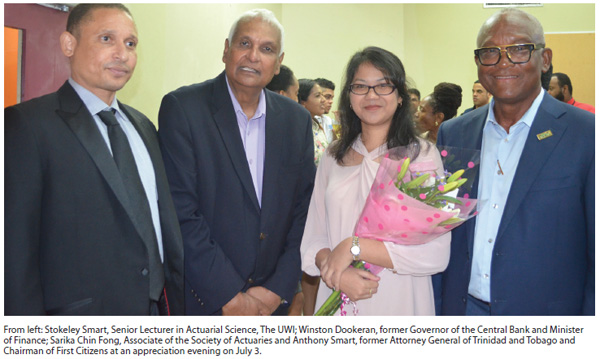
 If you never thought you’d need much maths smarts in your future, you were clearly not considering the very analytical (and profitable) career of actuary. One recent graduate of the BSc Actuarial Science programme at UWI, St Augustine, Sarika Chin Fong, has become its first graduate to achieve the Associate of the Society of Actuaries (ASA) professional designation, earning the respect and pride of UWI’s Department of Mathematics and Statistics. If you never thought you’d need much maths smarts in your future, you were clearly not considering the very analytical (and profitable) career of actuary. One recent graduate of the BSc Actuarial Science programme at UWI, St Augustine, Sarika Chin Fong, has become its first graduate to achieve the Associate of the Society of Actuaries (ASA) professional designation, earning the respect and pride of UWI’s Department of Mathematics and Statistics.
“Becoming a Fellow of the Society of Actuaries is one of the most difficult professional designations to obtain. Currently there are less than 20 nationals who are fellows,” came a missive from them.
For Sarika, achieving the ASA is cause for both celebration and relief. “I was in shock at first. Now I’m very proud and relieved that I managed to get this far. I am still far from the light at the end of my tunnel. I still have to get my FSA designation. But I feel like I can sit back and smell the roses a bit before I throw myself back in.”
The ASA designation is awarded after a rigorous series of exams and case studies. Says the UWI Department of Mathematics and Statistics: “The Associateship is the junior designation that one must obtain before becoming a Fellow of the Society of Actuaries. It is very unusual and quite significant an accomplishment for a university programme of less than ten years to have any of its graduates achieve an Associate designation so soon after completing their BSc in Actuarial Science. This is quite the academic milestone for this relatively young programme and for UWI.”
UWI’s BSc in Actuarial Science programme began in 2011. Sarika Chin Fong graduated from it in 2014 with First Class Honours, and after completing her professional examinations, she received the Associate of the Society of Actuaries (ASA) designation on April 6, 2018. It’s a fitting career for a person who as a child, says she loved maths “all day, every day.”
So what, exactly, is it that actuaries do?
Actuaries are financial experts who measure and manage risk to develop solutions for complex financial issues. To do this, actuaries must have a deep understanding of mathematics, statistics and business management. The programme at UWI includes courses in probability theory, economics, financial accounting, computer programming, linear algebra, analytical geometry, statistics, and asset & liability management.
Actuaries can work for many different kinds of businesses including insurance, banking, government, energy, marketing, predictive analytics and more. In the Caribbean, the two main areas of actuarial work are life insurance and pensions, according to the Caribbean Actuarial Association.
Last month the UWI Department of Mathematics and Statistics of the Faculty of Science and Technology, held a special event to recognise Sarika’s ASA status. The July 3 event featured video messages of congratulations from the President of the Society of Actuaries and the President of the Caribbean Actuarial Association. Other speakers included Dr Judith Gobin, Deputy Dean of the Faculty of Science and Technology; former TT Attorney General Anthony Smart, Chairman of First Citizens; and Kyle Rudden, who is Consulting Actuary & Managing Director of KR Services Ltd, the firm where Sarika now works.
For Sarika, the event was unexpected, but she took it in stride, telling he audience her story.
“In 2011, I applied to do the Electrical and Computer Engineering degree. The week before the semester started, the last week in August, I somehow set my sights on the new Actuarial Science degree. My parents’ determination to see the dean or any other person that could help was the real reason I ended up in the programme… They told me: ‘You like Maths, go do actuarial science, you’ll like that too and it’ll make money.’ So there I was, first day of UWI, not a clue of where to go. Eventually I figured out the ‘where to go’ part.” She added:
“The UWI programme was a mix of math, computer science and finance courses. I may have wanted to pull my hair out over the more financially-based courses. I had a math and science background, you see. The actuarial science courses were another story. Totally unfamiliar territory. But we came, we saw, we conquered. Our egos took some hits but we were better students for it.”
She says: “The professional exams were done on your own time, at your own pace. It was especially hard for me to find a rhythm between working, studying and living. Finding that balance was very satisfying for me. I liked that I was able to have some sort of social life outside these exams and work.”
She says dealing with some failure was all part of the learning experience of becoming an actuary:
“I failed my first exam ever in 2016. Ever. First fail in my life. Models of Life Contingencies. My friends told me ‘Welcome to the club! Let’s go drink.’ There are many profound quotes on failure. My advice to all of you about failing – it’s an experience and just like all experiences, you learn from it and move on. Take some time off from studying. Have fun, party hard (or sleep hard). And then, sign up for the next sitting. Just keep going. Self-motivation is very important.” |





